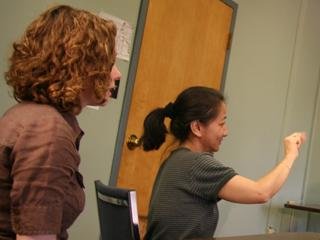Home
HomeMentor opportunities
- Home
- Mentor opportunities
So, let’s say you graduate from an interpreting program. What’s next?
Many new and aspiring interpreters work with a mentor who can support them in honing ASL or decision-making skills, preparing for national certification, or navigating the complexities of specialty areas like health care, mental health, government or performing arts venues.
Mentors are interpreting peers, Deaf people, interpreter educators and others who possess knowledge and skills to help other interpreters master the skill sets they desire.
Your program can help you connect with a mentor or a mentoring program in your area. For more in-depth information on mentorship visit .

I mean people don’t have to thank you profusely just a thank you or a sincere knowing in my own self that I did a good job has been rewarding. And, also, you know, the Latino community that hasn’t had services for a long time. It’s like a new paradigm for them having interpreting services in English, ASL, and Spanish. So if you’re lost in a situation like that and you’re there to support and give them what they’ve never had, you feel like you’ve done a more excellent job because they’ve never had those services. So there’s been many times where that’s been re-duplicated in that Deaf, Hispanic, Latino community. It’s rewarding.

Samuel Sema
talks about the value of having a mentor
- Home
- Mentor opportunities
© 2018 Home